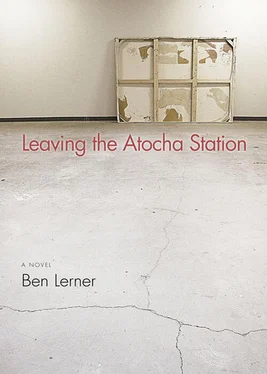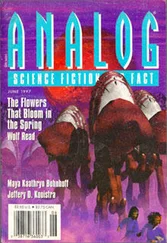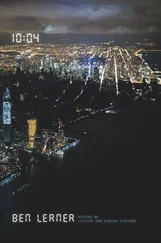I WOKE UP IN THE FIFTH PHASE OF MY PROJECT AS IF IN RESPONSE TO a loud noise. Isabel was still sleeping, maybe because of all the wine. I got out of bed, dressed, splashed water on my face, brushed my teeth with the complimentary brush, gargled the designer mouth-wash, and smoked a cigarette near the window. It was still early, rush hour. A few fire trucks passed by on El Paseo del Prado, sirens blaring. I was hungover, disoriented. Then several police cars passed. I leaned out the window and looked down the street, but couldn’t see anything. I told Isabel I’d be back soon; she shifted in her sleep as I left the room. I took the elevator to the lobby where people were huddled around TVs. I asked the bellboy in English what happened but he was distracted by other guests; I left the hotel and walked into the sun. Or was it cloudy?
Now trucks full of what looked like soldiers or special police were passing. I followed them toward Atocha, about a ten-minute walk, more and more fire trucks flashing by me, until I arrived at what they call a scene of mayhem. It was cloudy. There were police and medical workers and other people everywhere, many of them weeping and/or screaming, and, as I got closer to the station, more and more confusion. People streamed from the various exits, some of them wounded, lightly I guess, and emergency workers rushing in. I saw, I might have seen, a dazed teenager with blood all over his face and a paramedic who took his arm and sat him down and gave him something that looked like an ice pack, instructing him to sit and hold it to his head. There was an odor of burnt plastic. Someone asked me what had happened. Helicopters beat the air overhead. I wandered around for a few minutes, found a wall to sit against, shut my eyes, and listened.
After I don’t know how long, I stood and walked back toward and then up El Paseo del Prado, ambulances and people rushing past me. As I got farther away from the station I saw crowds in the doorways of bars and restaurants watching televisions and I could hear people saying “ETA” and quoting the estimated numbers of the dead, looking down toward the station and then back up at the screens. I reached the hotel lobby that was now packed and loud and took the elevator to my room; Isabel was gone. I felt in my pocket for my keys and rediscovered the necklace. I left the room, left the hotel, and walked up Huertas to my apartment. I climbed the stairs and took off my jacket and turned on my computer. It was almost ten. Surprised at how much time had passed, I opened a browser, called up the New York Times, and clicked on the giant headline. The article described the helicopters I could hear above me.
I wondered where Isabel had gone. Then I didn’t. I made some coffee, took one white pill, climbed through the roof, and sat with the coffee and listened. After a while I dropped back down through the skylight, brushed my teeth again, and left my apartment. I went to the bank of pay phones in La Plaza Santa Ana and called Kansas with my calling card. For a while all the lines were in use and they could not complete my call. I kept trying and eventually got through. It was around four in the morning there. The phone rang its foreign ring and finally my mom picked up, still half — asleep. It’s me, I said, and she asked what time is it, are you O.K. I said I was fine but there had been a terrorist attack. My dad was on the phone now, and asked me how far my apartment was from Atocha and I said I had been staying at the Ritz. This of course confused them both and again they asked if I was O.K. I hesitated and, voice cracking, said I had done a terrible thing. What, they said, and I told them that I had claimed in the presence of various people that my mom was dead or gravely ill and my dad was a fascist. Why, one of them asked, confused, but not upset. To get sympathy, I guessed. After a brief silence, my mom said she’d like to hear more about this later, but how many people had been killed, who was responsible, what was I going to do now, thank God I was O.K. I said I was exhausted and was going to try to sleep. They said that was a good idea and asked that I call them later, when it was night in Madrid. We said we loved each other and, before we hung up, my mom suggested I give blood.
I went back up to my apartment and refreshed the Times; the number of estimated dead was now around two hundred, at least a thousand injured. I considered walking back to Atocha, but instead I opened El País in another window and the Guardian in a third. I sat smoking and refreshing the home pages and watching the numbers change. I could feel the newspaper accounts modifying or replacing my memory of what I’d seen; was there a word for that feeling? The only other feeling I registered was fatigue. I fell asleep and when I awoke it was dark; I could hear café noise, albeit less than normal, in the plaza. I ate what there was to eat and read the news but my head was clouded; I could not process the conflicting theories regarding responsibility. The government maintained it was the separatists. I returned to La Plaza Santa Ana and called my parents again and my mom and I had a calmer version of the morning’s conversation; I would explain the Ritz-Carlton thing later, I said. I returned to my apartment, undressed, and went back to sleep, this time in my bed, until late morning.
When I woke I read about the emerging link to Al Qaeda, although the government still claimed it was ETA, and I watched a terrible video online of Atocha’s security camera footage, or was that many months later: an orange fireball bursting from a train, engulfing commuters with smoke, leaving the platform littered with bodies and stained with blood. There was to be a giant public demonstration against terrorism of all kinds that night across Spain. Even the king was going to march. I had lots of e — mails from friends and family and the foundation, none of which I read. I showered and left the apartment and walked toward Sol. There were trucks set up where you could give blood. I stood in line for a while at one of the trucks. When it was my turn, the woman asked me various questions about drugs, when I had eaten last, and other things I couldn’t understand; I told her I felt sick and she impatiently waved me away and asked for the next person in line. I said to myself that, by that point, they didn’t need blood for the injured anyway; they were probably still there only so people could feel like they were contributing; hadn’t they done that in New York?
As I walked toward El Retiro I thought about how blood from my body might have been put into the body of someone injured by History. It was cloudy and cold. I didn’t see anyone, not even the hash dealers. I sat for a while and then walked to the gallery, where Arturo and Rafa were. Later I learned that, while I was in the park, the entire city had emptied into the streets for a moment of silence without me. I was glad to see Arturo and Rafa and I told them so. We hugged each other and Arturo unloosed a torrent of language, saying he knew people who knew people who died, and speculating on what all this meant for the election, which was Sunday. If ETA were responsible, the Socialists, who were seen as weak on the separatists, would get destroyed. If it were Al Qaeda or other Islamic terrorists, the right-wing Aznar and his handpicked successor, Rajoy, were doomed; they had supported Bush’s war, the fucking fascists. I asked them if ETA did it and they said they didn’t believe it and something about tapes the police had found and it being the eleventh. While we were talking, Teresa arrived. She kissed me on both cheeks and scolded me for not having been around or writing her but she didn’t seem angry. The conversation about the bombings and their political repercussions resumed and I was quiet. Then Arturo took a phone call and Rafa went to the back of the gallery for something, leaving Teresa and me alone. She said I looked tired and I said I had passed several long nights and she asked me, smiling, if I had passed them with this Isabel woman. Without emotion, I said I was never going to see Isabel again. Teresa squinted and said not to make any decisions on her account, but, smiling again, admitted she’d been a little jealous: very little. I waited to feel a thrill, however distant.
Читать дальше












